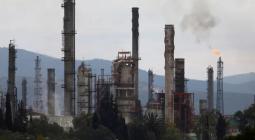No time to waste’: getting Australian homes off gas crucial for meeting net zero targets, report says

Getting households off gas for heating and cooking would cut energy bills and improve people’s health, and is necessary for Australia to have any hope of reaching net zero greenhouse emissions by 2050, a new analysis says.
The report by the Grattan Institute, a Melbourne-based thinktank, called on state and territory governments to set dates for the end of gas use and launch campaigns to encourage and help households become “all electric”, running on renewable energy.
It recommended governments also ban new gas connections for homes, shops and small businesses and set dates to phase out the sale of gas appliances and by which rental homes have to be fitted with electric cooktops and water and home heating systems.
The report said the transition to running on electricity will be challenging – about 5m homes across the country use gas. In Victoria, the most gas-reliant state, getting off the fossil fuel by 2050 would require an additional 200 households to get off it every day until then.
But it said the cost and health benefits would be significant. It recommended governments pay for upgrades to social, community and Indigenous housing and for a limited period offer low-interest loans and tax incentives for other households and landlords.
Tony Wood, the lead author of the report, said there was “no time to waste”.
“There will be costs to the great energy transition, and governments will need to decide who pays, how much, and when,” he said. “But we must do this for our hip pockets, our health and our environment.”
The report said it usually costs more to buy an electric appliance than a gas equivalent but electric options were more efficient and cheaper to run. The lower running costs of efficient electric appliances allowed households to recover more than the upfront cost over the lifespan of an appliance in nearly all cases.
Exceptions were for some homes in Western Australia, where gas is much cheaper than in eastern states, and for households that bought cheap, inefficient electric appliances.
On health, the report cited studies that found gas stoves released nitrogen dioxide and tiny PM2.5 particles that irritate lungs and have been linked to substantially higher asthma levels in children. Gas stoves may leak particles even when not in use, it said.
The report comes as the gas lobbying group the Australian Petroleum Production and Exploration Association has launched a national advertising campaign to bolster gas use, claiming it is “cleaner” than coal and crucial in getting the country to net zero.
In reality gas is a fossil fuel that adds methane and carbon dioxide to the atmosphere, increasing global heating. The Grattan Institute report said Australia would use it “for a while” but it must be cut to zero if the country was to reach net-zero emissions unless it planned to rely on extensive carbon offsetting. It said gas consumption forecasts were continually being revised downwards, but the current projected decline was not fast enough.
The report acknowledged governments had begun to take steps to support electrification of homes. The Albanese government announced in last month’s budget that about 110,000 households would be able to access $1bn in low-cost loans for double glazing, solar panels and cleaner appliances, with eligibility criteria to be announced later. It also promised $300m funding for social housing upgrades.
Victoria and the Australian Capital Territory have separate schemes to help households to get off gas and run on electricity. A campaign led by Saul Griffith, a former energy adviser to the US government and now head of Rewiring Australia, suggested a $13.5bn package to electrify homes.
The report found that while gas and pipeline industry leaders have argued that biomethane and hydrogen – sometimes described as “green gas” – could be used as alternatives for heating and cooking in homes, they were too costly and too far off for widespread use.
It said green gas may have a limited role at businesses that need high-temperature heat for industrial processes but there were “economic, technical, and logistical reasons” preventing it being a substitute for fossil fuels in most cases.
cover photo:A Grattan Institute report cited studies that found gas stoves release nitrogen dioxide and tiny PM2.5 particles that irritate lungs and have been linked to substantially higher asthma levels in children. Photograph: Dan Peled/AAP









